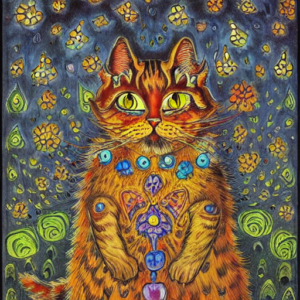by Mary E. Lowd
Originally published in Daily Science Fiction, April 2020

Catacomb laid her paw across the tiny heaving belly of the almost drowned mouse. The poor thing was frightened out of its mind; she could feel its fright through her paw, prickly and tingly. Mouse emotions were so funny.
“I saved you from the koi pond, Little One,” Catacomb purred. “Now your life is mine.” Never mind that the mouse would never have fallen in the koi pond if Catacomb hadn’t been chasing it. She could see herself through the mouse’s eyes: massive, terrifying, death-personified. The asymmetrical orange and black splotches that had inspired her human to name her Peaches (after a bowl of peach cobbler) looked like a devastating Halloween mask to the mouse. No sweetness. All murder.
“I won’t murder you, Little One,” Catacomb purred. “You’re mine, and I love you like all my minions. Would you like to meet them?”
The mouse’s eyes widened. The poor confused thing had no clue what was happening. Mice minds were so small. So easy for Catacomb to read. Tiny chambers, unlike her own labyrinthine self. Each chamber added to her own greatness and complexity as she stretched her mind out to fill the empty spaces inside of them. She was multitudes.
“Come now,” she purred, “you’ll feel much better when you’ve met the others.” She lifted up her paw, and the mouse’s heart raced even faster. Catacomb wouldn’t have thought that possible. But this mouse was strong. It would be a good minion. The mouse tried to dart away, but she reminded it of drowning in the koi pond, casting the memory of the water filling its tiny lungs back into its simple brain. The mouse startled, froze, and stood still. “That’s better. No running. Just follow me.”
The mouse followed Catacomb docilely, watching the tortie’s Halloween striped tail sway in front of its nose. Catacomb loved how fresh and bright the world always looked through a new minion’s eyes. She never felt more powerful than when seeing herself through the eyes of a mouse (or other little creature) she’d nearly murdered and then rescued. She was life and death. Savior and destroyer. She was everything. She was the circle of life.
Catacomb led the new mouse to her lair under the back deck of her human’s house. Dim light filtered down between the slats of the deck, slicing the darkness at regular intervals. Catacomb had hollowed out a comfy little den right in the middle. Well, she’d had her vole minion dig it out. No need to dirty her pristine feline claws on anything as mundane as dirt. That’s what voles are for. She settled comfortably into her den, and then she called out with her mind, summoning her other minions to her side.
The vole, three mice, and a hunched-over rat crept out of tiny holes in the back of the den, and a beleaguered-looking songbird hopped down into the darkness from the nest it had built under the deck. An earthworm, two crickets, three potato bugs, and a centipede gathered respectfully beside Catacomb’s left paw. She loved the squirmy sensation of how it felt to move as an earthworm, and experiencing all of the centipede’s legs tickled her mind so much that it made her laugh every time she extended her mind into the tiny, little chamber of its brain. Her final minion — perhaps her favorite — slithered its way over from the home it kept in the coiled up garden hose. She could watch the sinuous way that snake slithered all day.
“Dance for me,” Catacomb purred, and the garter snake obeyed. It slithered up in front of her, lifted up its head from the ground and began swaying. Catacomb’s eyes immediately dilated with pleasure. “Lovely,” she purred. “You need music. Sing,” she commanded the others.
The song bird’s voice soared, full of the lightness and joy of flying, a sensation that Catacomb could experience now, vicariously through her beloved minion. The crickets chirped along, providing rhythm, and the three original mice squeaked harmonies.
“Can you sing?” Catacomb asked her new mouse.
The tiny creature’s round ears splayed low, and its whiskers drooped, but every time it thought about running away, Catacomb filled its mind with the silent bottom of the koi pond and the choking, spluttering, pressure inside its lungs.
“Sing, Little Mousie,” Catacomb urged.
The mouse caught the eyes of one the other mice, and Catacomb took pleasure in the solace the two mice found in looking at each other. “See, I knew you’d feel better when you met the others.”
The rhythm of the crickets was catchy, and the songbird’s lead vocal sounded like hope and love and freedom on a summer day. The joy of being alive.
The new mouse crept over to join the chorus of mice, and raised its voice with them in a tremulous, off-pitch squeak. After a few tries, it managed to join the harmony in perfect pitch, making them a tiny barbershop quartet of mice.
Catacomb smiled as her tiny orchestra continued to sing for her. But behind the music, the mouse still heard the oppressive, deafening silence from the bottom of the koi pond echoing inside its ears and wondered whether its new life, every movement controlled by the capricious whimsy of a mind-controlling cat was all that different.
